When my son was little, I didn’t know what he wouldn’t know. That may sound silly to write out, but it is one of the easiest ways to describe the unease that comes with an autism diagnosis.
What did “autism” mean? To break it down further, what did “non-verbal” mean? While autism, in the general sense, was something that had its own movie of the week, non-verbal never did. Hearing it said back then conjured up images of miracle workers and dire circumstances. To a parent with a baby who was technically still at the age when language was emerging, visualizing that lack of speech in an adolescent was unfathomable.
My only assumption was that he wouldn’t understand anything. After all, Lucas was already worlds away during so many of our interactions. He didn’t interact with toys in the traditional sense or follow pointed directions. He often seemed unresponsive when people entered the room, absorbed entirely in his own world.
Most times, his take on things was hard to understand. Games he invented for himself included glares in windows, reflections in mirrors, and repetitive flicks of his cardboard book pages. To an outsider, it all appeared random. Nothing he did made sense.
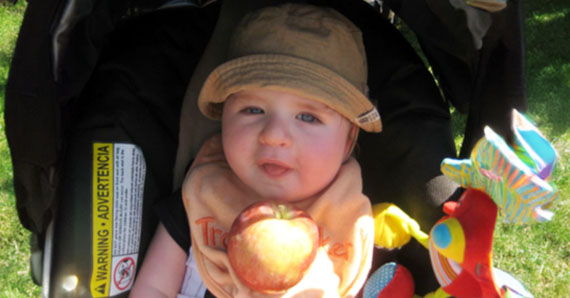
We were still far away from discovering these motivations. I hadn’t yet realized that his stimming behaviors were less about random movements and more about making himself happy. I had yet to see that, for Lucas, starting and stopping a Sesame Street video during a particular sound effect was just as exciting for him as it was for another child to watch it all the way through. To me, his world was a mystery, filled with behaviors and interests that I initially couldn’t understand.
I loved my boy and went through a lot to ensure he knew that. Even during this time, when I felt he wasn’t completely aware of all that was going on, I made him part of our world. We read books and sang songs, even when I doubted he could understand them. I wanted him to know that I was there for him in all the ways he needed.
My expectation was that he would, at least, know that he could count on me. Still, the uncertainty of whether my son could feel or express love weighed heavily on me, casting a shadow of doubt over our future interactions.
Today, Lucas is 13 and I know for a fact that he loves me. I know because I’ve watched him emulate the ways in which we’ve shown him through the years.
I hug my kids. I always have. Even as my neurotypical daughter has grown into a prickly teenager, I still sneak in an embrace when I can. Lucas, unable to complain, gets them constantly. Tickling, wrestling, and kisses on the cheek are all part of our daily routine.
Unlike other boys his age, Lucas doesn’t push these things away. He laughs and lets me in. It’s a response I was worried would be the opposite by the time he hit this age. TV teaches us many things about autism. Hugs and kisses are not two of them.
Yet, it worked. Showing him what it meant to be appreciated helped him learn to demonstrate the same. The boy in my home today is unlike any I would have ever pictured.
Seated on the couch, I’ll feel his presence hovering and look up to see him behind me. He leans over with a smile, places a hand under my chin, and kisses me on the top of the head. Why? No reason. He doesn’t want anything other than to show me affection. That’s who he is. Nothing is done for selfish reasons.
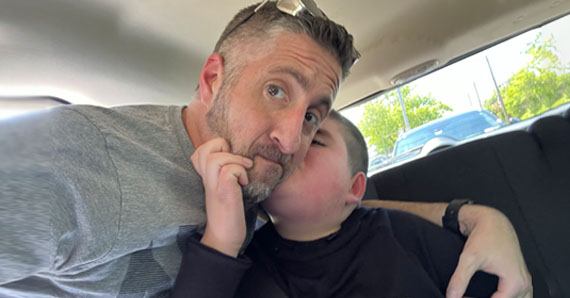
This type of behavior is a constant with Lucas. My absolute favorite is whenever I am on the floor tying his shoes. Knelt down before him, I’ll find myself looking down at his feet. As I wrap the laces around one another, I’ll feel his hand under my chin.
He will then slowly raise my head, where I will see his big smile, mere inches from my face. With the most welcoming grin you’ve ever seen, he’ll kiss my forehead. It’s ridiculously cute.
Then he does it repeatedly to the point that I have to say, “Thank you, kiddo, but I really need to tie your shoes. No more kisses. We have to…OK. Fine. Thank you, buddy.”
…And he just keeps doing it. It becomes a joke and soon we’re both laughing.
Had you told me in 2013 that my son would not only express love so much that I had to tell him to ease up, I’d be shocked. If you told me that we’d laugh about it as a common joke, I’d be even more shocked. That’s because, to me at the time, non-verbal didn’t have much of a meaning. Its only definition was “catastrophe”.
Thats not what it means. It also doesn’t mean incomprehension. Being non-verbal simply means learning and teaching require more patience and understanding. I couldn’t give him a workbook or lecture to show him basic things that another child his age would learn. Life skills and academics all require a specialized way of teaching.
Love? That one didn’t require much at all. He just needed to know that I love him and this is how I show it. Once I did, he took it from there. Lucas is the most affectionate boy you’ll ever meet. It sometimes blows me away how far off my fears ended up being when he reached the age that terrified me most.
Parenting a child like him is a marathon. It’s not a sprint. Your children become the people you make them into. The work you do today and the things you demonstrate will be mirrored tomorrow.
It requires endless patience, profound kindness, and deep understanding on both our parts. These are the values that guide us, molding the beautiful relationship that we cherish every day.
READ NEXT:
The Power of Preparation: My Son with Autism’s Party Success Story
Hear James discuss this post and more on Friday’s Hi Pod! I’m Dad Podcast!
NEW PODCAST EPISODES ARE POSTED EVERY FRIDAY ON HIPODIMDAD.COM!
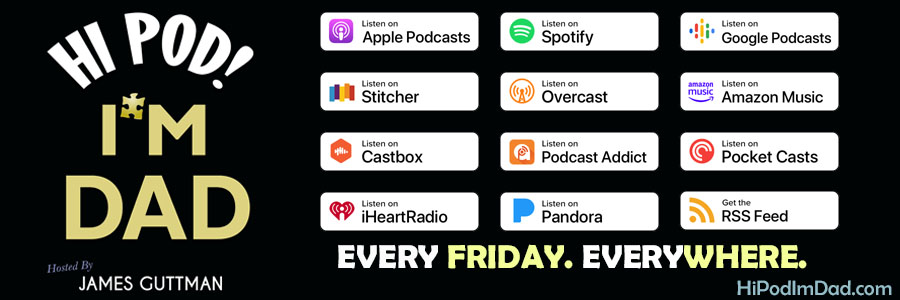

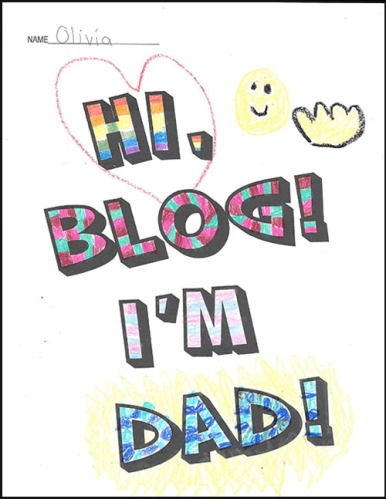

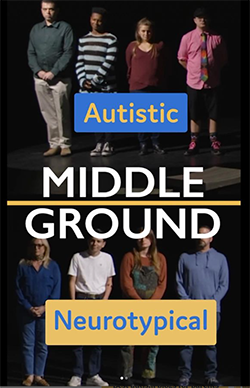
You must be logged in to post a comment.